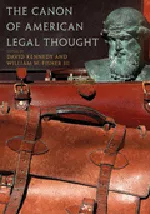
The Canon of American Legal Thought
Published
Book Description, from Amazon:
This anthology presents, for the first time, full texts of the twenty most important works of American legal thought since 1890. Drawing on a course the editors teach at Harvard Law School, the book traces the rise and evolution of a distinctly American form of legal reasoning. These are the articles that have made these authors--from Oliver Wendell Holmes, Jr., to Ronald Coase, from Ronald Dworkin to Catherine MacKinnon--among the most recognized names in American legal history.
These authors proposed answers to the classic question: "What does it mean to think like a lawyer--an American lawyer?" Their answers differed, but taken together they form a powerful brief for the existence of a distinct and powerful style of reasoning--and of rulership. The legal mind is as often critical as constructive, however, and these texts form a canon of critical thinking, a toolbox for resisting and unraveling the arguments of the best legal minds. Each article is preceded by a short introduction highlighting the article's main ideas and situating it in the context of its author's broader intellectual projects, the scholarly debates of his or her time, and the reception the article received.
This anthology presents, for the first time, full texts of the twenty most important works of American legal thought since 1890. Drawing on a course the editors teach at Harvard Law School, the book traces the rise and evolution of a distinctly American form of legal reasoning. These are the articles that have made these authors--from Oliver Wendell Holmes, Jr., to Ronald Coase, from Ronald Dworkin to Catherine MacKinnon--among the most recognized names in American legal history.
These authors proposed answers to the classic question: "What does it mean to think like a lawyer--an American lawyer?" Their answers differed, but taken together they form a powerful brief for the existence of a distinct and powerful style of reasoning--and of rulership. The legal mind is as often critical as constructive, however, and these texts form a canon of critical thinking, a toolbox for resisting and unraveling the arguments of the best legal minds. Each article is preceded by a short introduction highlighting the article's main ideas and situating it in the context of its author's broader intellectual projects, the scholarly debates of his or her time, and the reception the article received.
